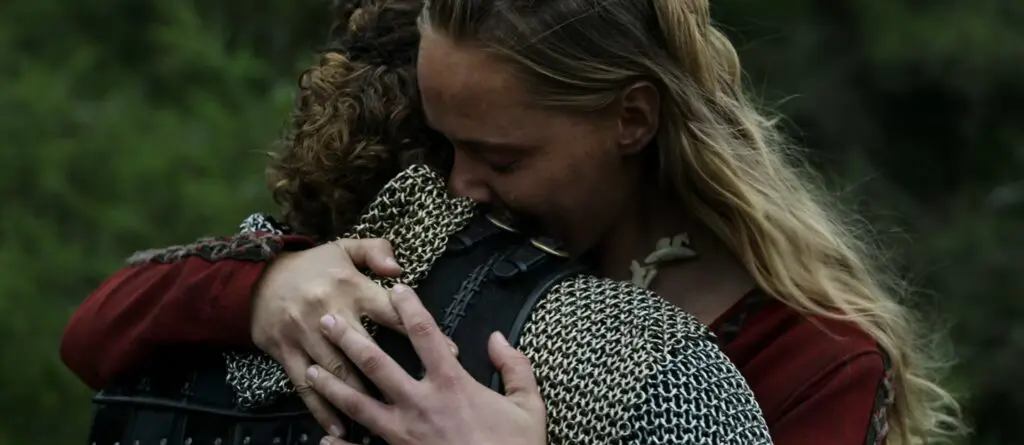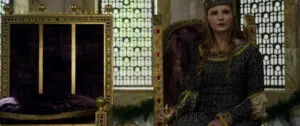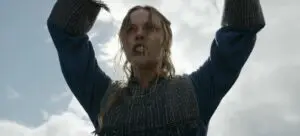Summary
Season 3 ends surprisingly open-ended, with hopes that the series may continue in the future. In a finale-esque chapter, there’s action, changing of thrones, and reunions solidifying a worthwhile series.
Power is a strange thing. The throne is still warm from the previous occupant as someone else sits in it. That’s the key message from the ending of Vikings: Valhalla Season 3. Episode 8 is titled “Destinies,” but I think the title is misaligned. The destiny of each character is manifested for sure, but in a game of violence and betrayal, it’s whoever strikes first who gets lucky. As Leif said to Canute in Episode 7, “Strength and Intelligence” can be a strong variable in these instances.
A lot happens in the Season 3 finale, so I’ve broken down the key moments and determined what they mean.
Key Moments from Vikings: Valhalla Season 3, Episode 8
Queen Emma defends the throne of England as she grieves
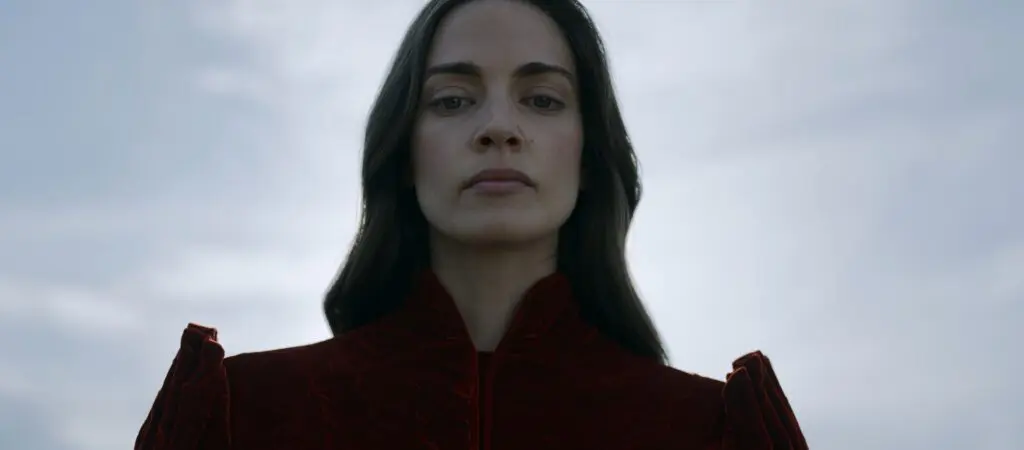
Queen Emma grieves over her husband King Canute’s death in the ‘Vikings: Valhalla’ Season 3 finale (Credit – Netflix)
King Canute tried his best for a peaceful transition, and while it may not have worked in Kattegat, there’s an argument that he kept some decorum in England at least. Declaring a decree that Queen Emma rules after his death is mainly ceremonious, but Godwin quickly tells Emma to call for Edward, as he believes Canute is blinded by his love for her, which will lead to civil war. Emma, surprisingly, has already called for Edward.
Seeing Canute die was far more emotionally impactful than I thought it would be. Emma and the king genuinely care and love each other, and the Queen tries to hold on as he takes his last breath. But Emma is intelligent, too. Maybe it was not Canute’s love that blinded him, but he trusted his wife to do the right thing after his passing.
And so, Harefoot returns, not Edward, much to the surprise of Emma. Godwin planned this from the start, to usurp Emma as soon as Canute left his seat. As Godwin prepares for Harefoot’s coronation for King of England, Emma thinks wisely on the spot and tells Godwin that she’d like to speak to Harefoot, her stepson, privately. She holds his hand, signifying that she will create a Royal Union, which seemingly frustrates Earl Godwin.
But Earl deserves it, no? When Canute was dying, he told Godwin that he had brought him into this family by marrying him to Gytha, his wife. And that one day, Godwin’s children may rule. Canute asked Godwin to support Emma on his last breaths, with his family depending on it. Godwin still decided to dishonor a dying king’s wishes. He also underestimated Emma’s love for Canute, who decidedly joined hands with Harefoot so she could find a way to continue her husband’s legacy.
Stigr looks for Harald in chilly Greenland
Stigr cannot compete with Harald Harald Sigurdsson, but he’s been a good man to Freydis, hasn’t he? The finale of Aeason 3 sees him traveling through the chilly weather of Greenland to find Freydis’ son, Harald II.
Little did he know that Erik the Red sent one of his men, Lang, to attack him. He nearly kills him, as he’s left wounded in the snow. Luckily, Harald II, proving courageous like his father, finds him with a Kalaallisut.
It’s a shame this story will not continue as the series ends. It would have been great to see Harald II grow into a strong Viking, with Stigr’s guidance, and to have a reunion later with his parents.
The next King of Norway takes center stage in the Season 3 finale
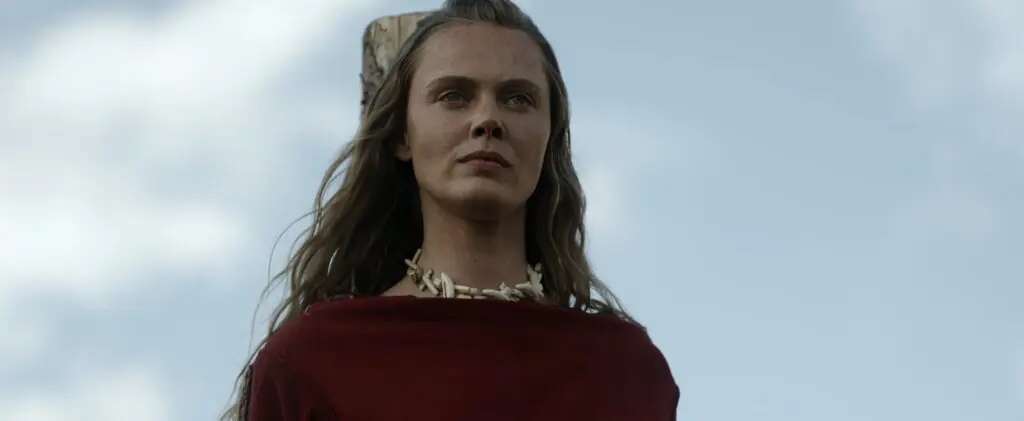
Freydis is sentenced to death by burning by Lord Magnus at the end of ‘Vikings: Valhalla’ Season 3 (Credit – Netflix)
You’d like to think that after seven episodes, the writers decided to opt for a simple storyline to conclude matters, but they managed to fit in many subplots to conclude the King of Norway and end the series.
Leif is in North Kattegat, looking for Lord Magnus, after learning what the man did to Freydis and the people of Jomsborg. But he bumps into his old friend Harald, who is ready to be the King of Norway. There are a lot of complications, though; Magnus is the strongest in the running for king due to the Pope’s approval (Olaf’s body helped with this). Magnus has also managed to get Svein’s men to turn on the King, killing him next to the lake. Svein is dead, so the throne is ready to be taken.
Interestingly, at this juncture, Leif learns that Harald’s main guards, Kaysan, Dorn, and Battu, are dead, but Harald is vague about how this happened. He believes Harald has hardened due to his experiences in Constantinople, but not for the better, but this turns out to be a misdirection for the audience to make for the ending.
Magnus announces himself as the new King of Norway and tells Queen Aelfgifu that her son is dead before killing her. But then he learns that Freydis is alive and in Kattegat and is understandably spooked.
Harald also announces himself as the rightful King of Norway, but again, Magnus reminds the people of Kattegat that the Pope will not accept Pagan sympathies. He brings a captured Freydis into the halls, claiming she is a “witch.” Freydis is forced to confirm that she is the Leader of the Pagans and has a child with Harald, a son and an heir.
Magnus puts the next king down to a vote while threatening the wrath of their Christian God, but surprisingly, the people vote for both Harald and Magnus to rule together. Magnus agrees, under one condition — that Norway never returns to old ways and that they burn Freydis to death. Again, another misdirection is given here as Harald agrees to Freydis’ execution. As the audience, we know he has feelings for Freydis — you can tell by how they look at each other even though they have not seen each other for years. It would have been incredible if they had written in such a pivotal betrayal at this moment.
But before I delve into the ending of Season 3, it’s evident that the writers were a little stuck rounding all this up by the eighth episode. It does feel like a mistake that they had to end all this in three seasons. There’s so much potential in the story. A slower pace would have benefitted this story. Kings are killed and made quickly in Season 3.
The ‘Vikings: Valhalla Season 3’ ending surprisingly leaves the door open for Season 4
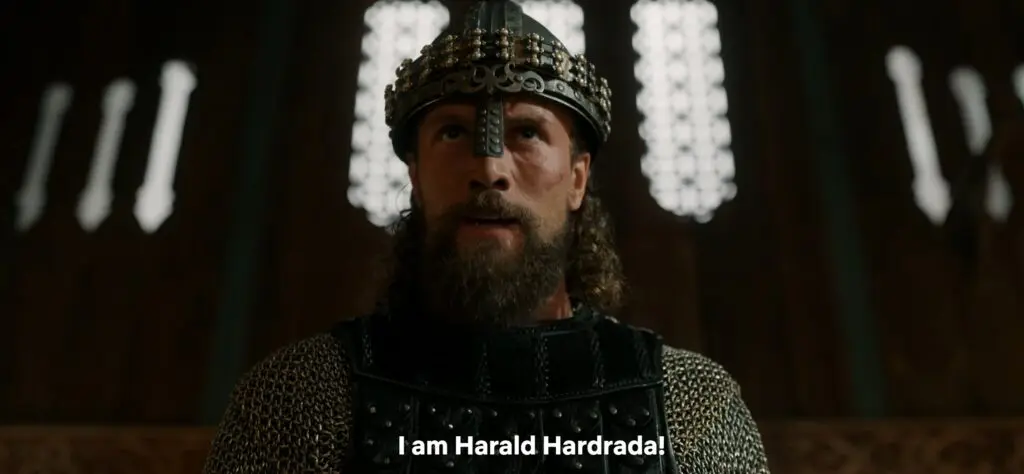
Harald becomes King of Norway and names himself Harald “Hardrada” in ‘Vikings: Valhalla’ Season 3, Episode 8 (Credit – Netflix)
If the series is based on historical events, it will be hard not to be open-ended, but this doesn’t feel like the last episode. It’s possible that the writers wanted to keep it open in case another network or streamer picks it up, which would be ideal. But I liked the ending, even though it felt predictable.
Magnus and Harald are declared Kings of Norway (even though it’s so obvious they’d rather kill each other), and the coronation includes the burning of Freydis. As she’s about to be set on fire, Freydis calls out to the Gods, which follows with random fires spreading around the village (Leif uses the same chemical used in Sicily to set buildings on fire).
The people of Kattegat suddenly panic, believing that Freydis has enlisted the Gods to exact vengeance on them all. Harald is smug and relaxed as Magnus becomes irritated. Then, Leif frees Freydis, and a group of men take her away.
Harald would never betray Freydis, even if the writing had you believe he became so “hardened” that he chose ambition over loyalty. It would have been such a poor choice of writing if Harald had decided to ignore his historical alliances with Leif and Freydis and allowed Freydis to be burned alive. It still makes for a well-directed episode, though.
In the aftermath, in the woods, Harald tells Freydis that he had to stop her from killing Magnus as it is his responsibility as king to deal with him. Despite Freydis’ annoyance towards Harald, there’s a moment where they acknowledge each other’s destinies as they find each other again.
Leif and Freydis will be setting off on boats to find the “Golden Land” they seek. Harald acknowledges Leif as “Leif the Lucky.”
An interesting conversation follows as Harald asks for the first time about his son, Harald II. Freydis describes him as similar to his father: brave, strong, and caring. Harald tells her he is no longer that man, but Freydis knows the man she loves is still there, as she sees him in her son. She hopes he does not take too long to see him.
I’m glad Freydis and Harald had this final moment together in the series. They are easily the most interesting characters, and the story has been easy to follow. It is a shame it has to end.
Vikings: Valhalla Season 3 ends in the most Viking way possible. Harald orders for Magnus to be chained up and thrown into a cell, which is met with dismay by his people. But Harald stands in his best form, showing the type of masculinity we would expect from him, and tells everyone that he is the King, and this is his ruling — he vows to make his Kingdom the most powerful on earth, and he dares any Viking to challenge him. At this moment, he names himself “Harald Hardrada,” and the people chant his name to complete the series.
While we would not expect any other ending, I’m glad it ended with Harald claiming what is his, especially after he spent several years manifesting it.
What did you think of Vikings: Valhalla Season 3, Episode 8? Do you believe it was a good ending to the series? Would you want a Season 4? Join in on the discussion below.

